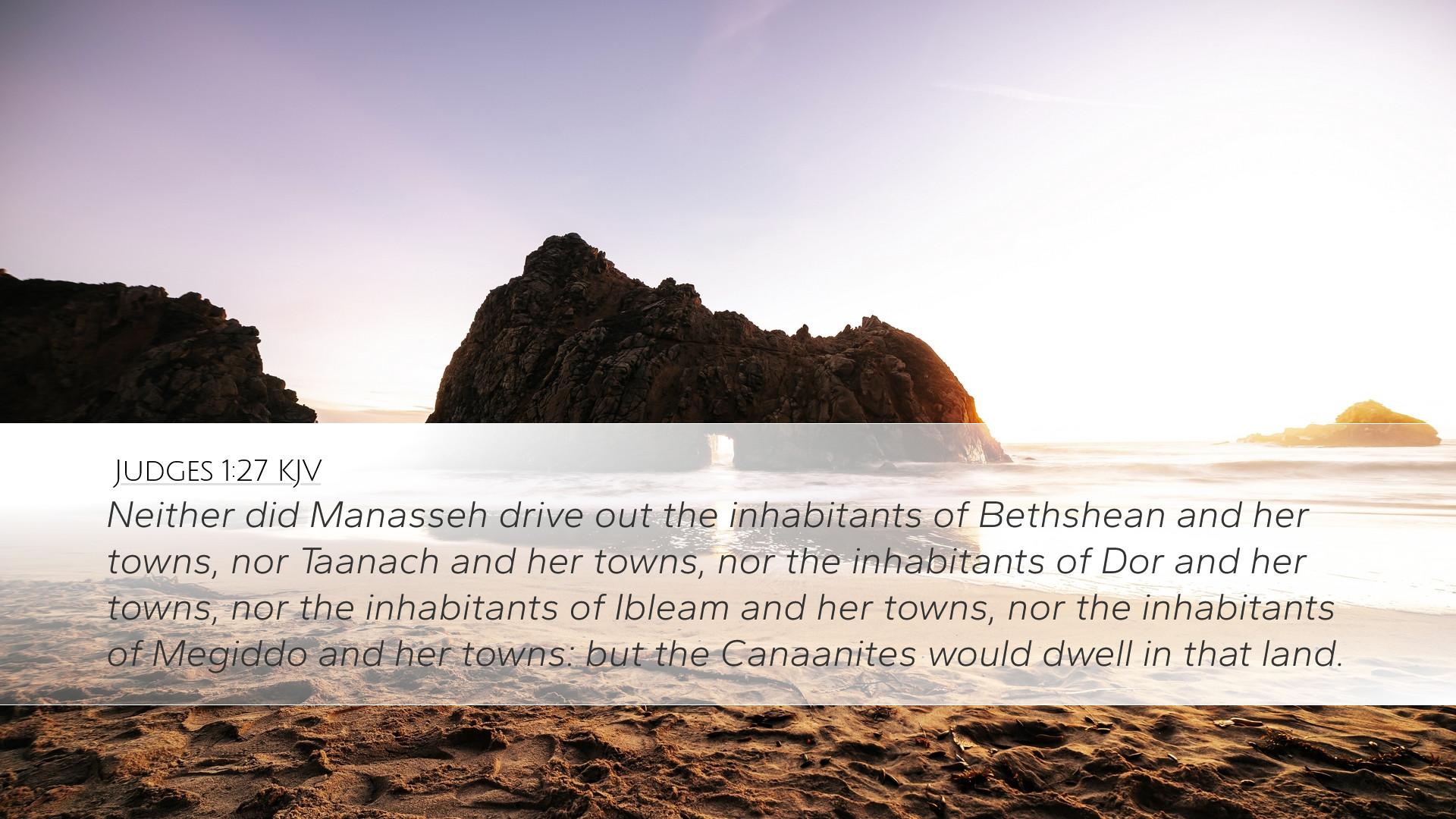Commentary on Judges 1:27
Judges 1:27 states: "And Manasseh did not drive out the inhabitants of Bethshean and her villages, nor of Taanach and her villages, nor the inhabitants of Dor and her villages, nor the inhabitants of Ibleam and her villages, nor the inhabitants of Megiddo and her villages: but the Canaanites would dwell in that land."
Overview
This verse highlights the incomplete conquest of the land by the tribe of Manasseh, a significant theme in the Book of Judges. The failure to fully drive out the Canaanites symbolizes the spiritual and moral compromises that characterized Israel's history during this period.
Insights from Public Domain Commentaries
Matthew Henry's Commentary
Matthew Henry emphasizes the dangers of partial obedience to God's commands. He notes that the tribes were instructed to drive out all the inhabitants of the land God promised them. The failure of Manasseh to do so demonstrates a lack of zeal in fulfilling God's command, leading to disastrous consequences for Israel later on. Henry indicates that allowing the Canaanites to remain was not merely a military failure but a spiritual one.
- Partial Obedience: Henry suggests that Manasseh's hesitance can be attributed to a cowardly spirit or complacency that led them to coexist with the Canaanites, instead of removing them entirely.
- Consequences: The presence of the Canaanites ultimately led to conflict and idolatry, which would plague the Israelites in later chapters.
Albert Barnes' Notes on the Bible
Albert Barnes provides a critical examination of the geographical locations mentioned in Judges 1:27. He identifies the cities and their significance, noting that these places were strategic and valuable for control of the region. Barnes also reflects on the disobedience of Manasseh, which not only demonstrates a failure of military action but also reveals a deeper spiritual issue.
- Geographical Significance: The cities mentioned—Bethshean, Taanach, Dor, Ibleam, and Megiddo—were central to commerce and military routes, making their occupation vital for the Israelite tribes.
- Spiritual Implications: Barnes points out that Manasseh's inability to fully exterminate the Canaanites illustrates the nation's drift from total reliance on God and His promises.
Adam Clarke's Commentary
Adam Clarke offers a thorough analysis of the historical and cultural context of the Israelites’ conquest of Canaan. He remarks on the complexity of the challenge that the Israelites faced from well-established Canaanite communities and the resultant impact on Israel's faithfulness to God. Clarke provides insights on the ramifications of this inaction.
- Cultural Context: The Canaanites had established cities with fortified structures; thus, the task of displacing them was formidable and fraught with challenges, leading to worldly compromises by the Israelites.
- Long-term Consequences: Clarke explains that the unavenged state of the Canaanites led to cycles of oppression, as they later became a source of temptation and moral failure for the Israelites.
Theological Reflections
The reluctance of the tribe of Manasseh to fully drive out the Canaanites serves as a poignant lesson for contemporary believers. The ongoing presence of the Canaanites can be viewed as a metaphor for the unconfessed sin and spiritual complacency that can dwell in the hearts of believers today.
- Spiritual Warfare: This narrative illustrates the importance of recognizing spiritual enemies in the life of faith—those areas where temptation and compromise persist.
- Call to Vigilance: Just as the Israelites were called to drive out the Canaanites, believers are reminded to be vigilant regarding sin that seeks to take root in their lives.
Conclusion
Judges 1:27 serves as a sobering reflection on obedience, faithfulness, and the consequences of compromise. The insights from Matthew Henry, Albert Barnes, and Adam Clarke illuminate the dangers of half-hearted commitment to God's commands, making this verse a critical focal point for pastors, theologians, students, and all seekers of biblical truth.


